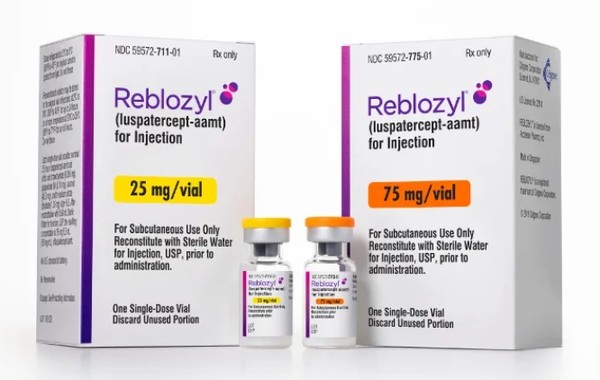BMS’ anemia treatment Reblozyl (ingredient: luspatercept) arrived in the Korean market only two and a half years after the company completed drug development in the U.S.
The Ministry of Food and Drug Safety authorized Reblozyl to treat adult anemia patients who failed an erythropoiesis-stimulating agent (ESA) and required red blood cell transfusions due to myelodysplastic syndromes (MDS) or myeloproliferative neoplasm (MPN). Also, the drug is indicated for adult patients with beta-thalassemia who require regular red blood cell transfusions.

MDS patients should have very low- to intermediate-risk with ring sideroblasts (MDS-RS) to receive the treatment. Those with MDS/MPN should accompany ring sideroblasts and thrombocytosis (MDS/MPN-RS-T).
Reblozyl is the first-in-class erythroid maturation agent that reduces Smad2/3 signaling and enhances red blood cell production by selectively binding to TGF-β ligands.
The treatment obtained the U.S. FDA approval to treat beta-thalassemia for the first time in November 2019 and expanded indications to treat anemia patients with MDS-RS or MDS/MPN-RS-T in April 2020.
Reblozyl won the Korean license only two and a half years after the first approval in the U.S.
In April last year, the MFDS designated Reblozyl as an orphan drug.
The Korean permit was based on results from two phase-3 studies – BELIEVE and MEDALIST.
In the BELIEVE trial on 336 adult patients with beta-thalassemia who required red blood cell transfusions, 21.4 percent of the Reblozyl group (224 patients) reached the reduction of red blood cell transfusion burdens. In contrast, only 4.5 percent of the placebo group did so.
In MEDALIST on 229 patients who failed ESA and accompanied very low, low, and moderate risk MDS-RS or MDS/MPN-RS-T, 37.9 percent of the Reblozyl group (153) remained transfusion-free for eight weeks or longer, compared with 13.2 percent of the placebo group.
As Reblozyl reduced transfusion burdens in blood cancer patients significantly through a new mechanism, its sales surged immediately after the market release.
According to an annual report by BMS in 2021, Reblozyl sold $551 million globally last year, more than a 100 percent jump from $274 million a year earlier.
Industry watchers said Reblozyl’s expansion of indications has just started.
The drug broadened the treatment scope to MDS/MPN and planned to do so for beta thalassemia patients without dependency on red blood cell transfusion, backed by promising data.
Late last year, BMS applied to the FDA for expanded indications of Reblozyl to treat non-transfusion dependent (NTD) beta thalassemia based on phase 2 BEYOND trial outcome. The FDA is expected to decide by June.
Reblozyl is also being tested in the global phase 3 INDEPENDENCE trials in patients at 150 institutions in Europe, North America, Asia, and Australia, based on robust data of the phase 2 study on patients with myelofibrosis-associated anemia.
BMS said Reblozyl could become the leader in blood cancer treatment.

